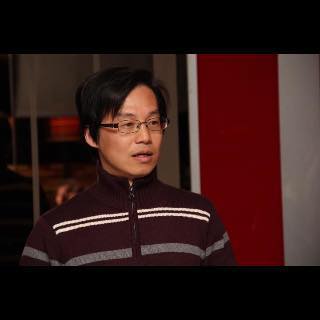
Center for General Education
Reading is not merely about conveying words; it encompasses endless possibilities and values. In today’s society, with the development of technology, multimedia forms of reading experiences bring richer possibilities. Professor Hsiang, who loves reading, expands his understanding and comprehension of the world through diverse reading experiences. He integrates the knowledge and feelings gained from reading into teaching, inspiring students’ desire for knowledge and stimulating their thinking and creativity. Through reading and teaching, Professor Hsiang hopes to let more students deeply feel the beauty of the world and possess the ability for independent thinking and comprehensive development.
Reading should not be limited but seen as a diverse and open experience.
Professor Hsiang believes that reading is the simplest and most economical way to understand the complex world, enabling one to comprehend the essence of the world and understand past events. However, in today’s environment that values instant results, the slow process of reading seems difficult and arduous. Creating a flexible, free, and open environment where students truly love reading is the primary focus of teaching.
In modern society, reading is no longer limited to textual presentation; it should be a diverse experience, including different forms such as text, images, sounds, and videos. Allowing students to be inspired, have fun, and gain knowledge through free browsing and using diverse reading to open the window to the world, fostering a passion for active learning and exploration. Professor Hsiang’s educational philosophy guides students into the beautiful world of reading, bringing endless joy and growth in learning.
Communication is like adjusting a radio; only when the frequency is right can you hear the clearest sound.
Freshman students are in the process of breaking free from the constraints of high school and transitioning into a world they can control, with space for self-exploration and imagination. Looking back, perhaps there are unfulfilled wishes or life experiences not deeply pondered. However, freshman year is a good time for reflection. Professor Hsiang recommends works in class, encouraging students to think about related issues and embark on self-exploration.
Through course arrangements, teachers and students communicate bidirectionally, sharing inner feelings through selected readings. Initially, they may not be very familiar with each other, and opening up and sharing growth experiences with others may not be easy. However, using works as a medium makes communication safer and allows for easy exchange of inner thoughts. For Professor Hsiang, the feedback from works in class may enrich his own gains more than the students’, and through the course, he understands students with different personalities, helping them find emotional outlets. This process is challenging and requires continuous experimentation, much like adjusting the frequency of a radio; only by finding the correct channel can clear messages be received.
Empathetic imagination enhances self-narrative ability.
Reading is not just about absorbing knowledge; it’s about empathizing and immersing oneself in the world of the work, using imagination to experience the lives of different characters. In class, students not only listen and memorize but also use empathy maps to place themselves in the roles of different professions, such as taxi drivers and grocery store owners. Students can better understand the inner world and thoughts of these professions, thus getting closer to the core messages conveyed in literary works and experiencing empathy and perspective-taking in a unique way, thereby opening up new perspectives on literature and life.
In class, many students may remain silent because they are afraid to express their thoughts. Professor Hsiang breaks students’ psychological barriers through anonymous discussions, encouraging them to open up and share their inner feelings and thoughts. At the same time, the teacher cleverly selects works related to students, eliciting resonance and reflection on the emotions in the works, and encourages expressing one’s thoughts in writing. This interaction fills the classroom with students’ vitality and enthusiasm, not only enriching imagination and empathy in the literary world but also finding ways to express oneself in life. Through reading and reflection, one can better understand oneself and the surrounding world, gaining confidence and courage to face life’s challenges, which is the educational value of reading and empathy.
Bringing the world into the classroom; experiencing the world through the classroom.
Professor Hsiang, known for his unique teaching methods and care for students, firmly believes that teaching is a process of continuous reflection and learning. He frequently participates in exchange activities and seminars, learning the latest teaching models and knowledge, spending a lot of time preparing courses and updating materials to ensure the best teaching effectiveness. In class, he always takes student feedback as his guide, understanding each student’s needs and background, and adjusting teaching content accordingly, providing professional feedback and applications.
When leading students to read the Orchid Pavilion Preface, Professor Hsiang prepared tools such as brushes and ink for students to write the Orchid Pavilion Preface, creating a sensory and meditative experience for students to appreciate literary works. Some students even turn calligraphy into ink paintings and comics, making learning more interesting and stimulating students’ motivation and exploration desire. Professor Hsiang believes that every learning experience has its value and is committed to guiding students to maintain curiosity and enthusiasm for the world, where the teaching goal is not only to impart knowledge but also to lead students into a joyful and exploratory learning journey.
閱讀不僅僅是文字的傳達,它蘊含著無盡的可能性與價值。對於現代社會而言,隨著科技的發展,多媒體形式的閱讀體驗帶來更豐富的可能性。喜愛閱讀的鴻全老師透過多元閱讀,拓展了對世界的認識和理解,並將獲得的知識和感受融入教學,啟發學生對知識的渴望,激發他們的思考和創造力。鴻全老師通過閱讀和教學,期望讓更多的學生能深刻感受世界的美好,擁有獨立思考和全面發展的能力。
閱讀不該受到侷限 而是多元開放的體驗
向鴻全老師認為,閱讀是認識這個複雜世界最簡單也最節省的方式,透過閱讀能理解這個世界的本質,了解過去發生過的事情。然而,在現今注重即時效果的環境,緩慢的閱讀過程似乎讓人感到困難和辛苦,如何營造一個具有彈性、自由且開放的環境,讓學生真正熱愛閱讀,便是教學首要重點。
在現代社會,閱讀已不再僅限於文字的呈現,它應該是一種多元的體驗,包括文字、圖像、聲音、影像等不同形式。讓學生透過自由瀏覽獲得啟發、樂趣和知識,並以多元閱讀打開對世界的認識之窗,激發主動學習和探索的熱情。向鴻全老師的教育哲學,引領著學生進入閱讀之美的世界,帶來無窮的學習樂趣與成長。
溝通就像是調整收音機 唯有頻率對了才能聽得最清楚
大一學生正處於從中學的升學束縛中解脫,轉變為能夠自主掌握的世界,擁有探索自我和想像的空間。回顧過去,或許有未能實現的願望或未深思的人生經驗,然而大一是思考的良好時機,向鴻全老師在課堂上推薦作品,鼓勵學生思考相關議題,展開自我探索。
透過課程安排,老師與學生進行雙向溝通,將內心情感通過選讀作品來分享。起初彼此相對不夠熟識,敞開心扉與他人分享成長經歷也較不容易,但透過作品作為中介則更加安全,能輕鬆交流內心所想。對向鴻全老師而言,在課堂上經由作品的回饋,可能自己的收穫比學生更加豐富,也能透過課程進行對照,理解不同個性的學生,幫助他們尋找情感出口。這過程困難重重,需要不斷嘗試,如同調整收音機頻道,只有找到正確頻道才能得到清晰訊息。
同理心的想像 增加自我敘事能力
閱讀不僅僅是為了吸收知識,要能夠感同身受進入作品的世界,用想像力去體驗不同角色的生活。在課堂上,學生不僅是聽講和記憶,更是透過同理心地圖的構建,將自己置身於不同職業的角色中,如計程車司機、雜貨店老闆等,學生能更深入地理解這些職業的內在世界和思想,從而更加貼近文學作品所要表達的核心訊息,以獨特的方式感受同理心和換位思考,藉此開啟對於文學及人生的新視野。
在課堂上,許多學生可能因害怕表達自己的想法而保持沉默。向鴻全老師則透過匿名討論,打破學生的心理障礙,鼓勵他們敞開心扉,勇於分享自己的內心感受和想法。同時,老師巧妙地選擇與學生相關的作品,引發對作品中情感的共鳴和反思,並鼓勵以文字表達自己的想法,這種互動讓課堂充滿了學生的活力和熱情,不僅在文學世界中豐富想像力和同理心,更在生活中找到了表達自我的方式。通過閱讀和思考,能更好地理解自己和周圍世界,更有信心和勇氣面對生活中的挑戰,這正是閱讀與同理心的教育價值所在。
將世界帶進課堂 藉由課堂感受世界
以獨特教學方式和對學生的關愛而聞名的向鴻全老師,深信教學是不斷反省和學習的過程,經常參加交流活動和研討會,學習最新的教學模式和知識,花費大量時間準備課程、更新教材,以確保最佳的教學效果。在課堂上,總是以學生的反饋為依歸,善於理解每位學生的需求和背景,並根據情況適時調整教學內容,提供專業的回饋和應用。
帶領學生閱讀蘭亭集序時,準備了毛筆、墨水等工具,讓學生用毛筆寫下蘭亭集序,藉此創造學生對文學作品的感受力和靜心體驗,有學生甚至將書法變成水墨畫和漫畫,讓學習變得更加有趣,激發學生的學習動機和探索慾。向鴻全老師相信每一次的學習都有其價值,並致力於引導學生對世界保持好奇與熱情,教學目標不僅是傳授知識,更是帶領學生走向快樂與探索的學習旅程。

